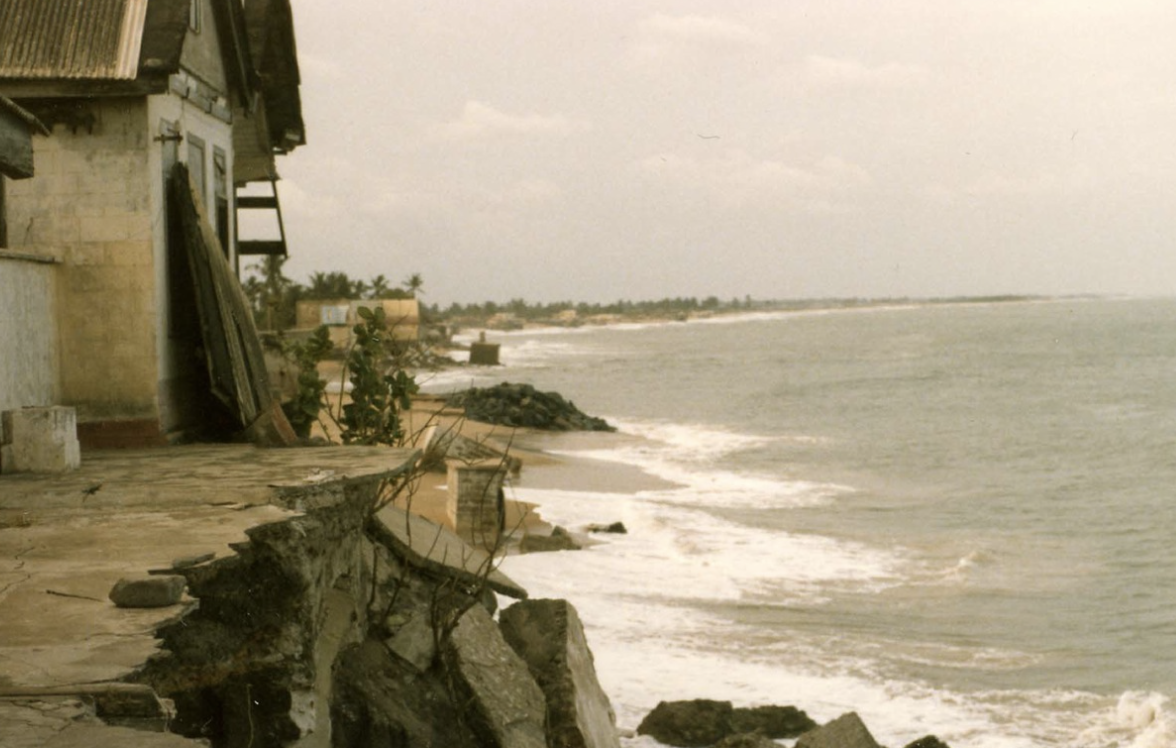News
While World Leaders Dither at COP28, a Small West African Community is Dying
In a bustling Ghanaian community nestled amid verdant landscapes and sparkling water bodies lies a testament to the impacts of climate change.

Keta, a once thriving community, has been violently reimagined by the growing effects of unsustainable development and slow action. Keta is not just an alarming local story; it illustrates the pivotal connection between our preparedness for climate change and the long-term socio-economic well-being of our nation.
In the Keta Municipality, a microcosm of this crisis, a population of nearly 150,000 faces the brunt of this environmental upheaval. Communities sustained initially by fishing, farming, and salt mining are now faced with persistent coastal erosion (with erosion rates and sand deficit estimated between 2 million and 7 million cubic metres of sand per year), displacing residents, decimating commercial activities (ships no longer dock there), and eroding valued cultural heritage and the siltation of the lagoon basin.
As a result, there are now significant problems with declining agricultural lands, decreasing soil fertility, reduced yields, disappearing coconut plantations, falling fish catches (marine and lagoon), and recurring flooding of farms. Evidently, the staggering effects of climate change span beyond immediate environmental concerns; the economic and human toll is profound.
Climate change is fundamentally reshaping Ghana’s landscape, particularly along its vulnerable eastern coastlines. The rising frequency of coastal flooding, driven by climate shifts, threatens infrastructure and livelihoods. Inadequate coastal management systems, alongside human activities, exacerbate these challenges, leading to severe erosion rates along the eastern coast. According to findings by the World Bank, the country’s economic and human development is intrinsically tied to its ability to adapt to climate change and climate-related shocks, projecting dire consequences on agriculture, infrastructure, and human capital. Floods, droughts, deforestation, and degraded land pose tangible threats to a nation already grappling with economic stability.
As temperatures rise and weather patterns become increasingly erratic, agricultural yields will dwindle, affecting incomes and driving up living costs. Labor productivity, especially in outdoor sectors such as agriculture and construction, will suffer due to heat stress and heat-related diseases, which could reduce agricultural labour productivity by an estimated 8.5% by 2050.
Average annual losses from droughts are expected to increase significantly, from $95-million in 2020 to more than $325-million annually by 2050. Research shows that with more pessimistic temperature increases (of 1.12 degrees Celsius), by 2050, agricultural yields are projected to decline by 1 to 21%, with most crops in the 2% to 6% range, translating to average price increases of around 13%, compared to a no climate change scenario. The spectre of conflict also looms larger as climate change fuels communal tensions over dwindling resources — a worrying phenomenon for a region facing coups and instability.
Collective efforts against climate change
Yet, within this narrative lies the crux of our responsibility: nurturing sustainable ecological practices, including in agriculture, in energy, in technology and several other areas. It needs a nuanced and concerted orchestration of efforts and resources from the government, private sector, civil society, and international partners to address the necessary changes, including equipping local farmers with sustainable agricultural methods, galvanising investments in clean energy projects, and incubating technological innovation rooted in environmental preservation and sustainability, among other measures.
Farmers can then diversify crops, households can invest in resilient infrastructure, and firms can strategise against climate risks. This resilience effort will require substantial resources, information, and support systems, which often need to be improved in vulnerable communities like Fuveme or Ada.
Getting the future right necessitates not mere rhetoric but resolute action. In an age dominated by the looming threat of climate change, recent events at COP28 in Dubai have sparked both hope and bewilderment. The complex negotiations and commitments made, such as the newly established loss and damage fund backed by $655-million in pledges, seem promising on the surface. However, a deeper analysis of the Climate Finance Files unveils a disheartening reality: two-thirds of pledged funds often fail to materialise. This discrepancy gets even more alarming given that an annual requirement of $2.4-trillion is essential for climate action in emerging markets and developing nations, apart from China, by 2030.
Climate strategy shortfalls
The glaring gap between promised climate financing and its actual implementation echoes loudly. In addressing the pressing issue of climate change and its disproportionate impact on small and rural communities, it’s crucial to acknowledge the current inadequacies in climate adaptation strategies. Presently, these approaches have been known to often overlook the crucial involvement of local communities, whose intimate knowledge and practical engagement could significantly enhance effectiveness in these critical areas. How would these funds be distributed and managed without the donors over-engineering the fund, favouring certain recipients for geopolitical reasons, or pouring it down the drain of countries with questionable financial management systems?
As activists advocate for concrete actions, the imperative of actionable, pragmatic plans becomes increasingly critical for places like Fuveme and Keta, and more broadly Ghana, or Mozambique, Nigeria, Somalia, Kenya, and many others.
The urgency to act now cannot be overstated. Ghana stands at a crossroads where climate change is not just an environmental issue but a threat to livelihoods, economies, and social stability. Allocating funds to green initiatives and fostering a culture where private entities can invest easily and profitably in sustainable projects are pivotal. Furthermore, integrating sustainability metrics into policy frameworks can serve as a compass guiding the country’s journey toward an environmentally conscious approach to economic growth. We do not need to wait for hell to break loose to scamper for help. Over the past years, increasing floods, even in Accra, have done enough damage to lives, livelihoods, and property.
It must be acknowledged that efforts have been made to tackle the damning effects of changing climatic conditions. Keta has a sea defence project, which still needs more coastal management. Energy has also seen several projects. Ghana has exemplified strides in renewable energy adoption, marking a notable shift towards sustainable practices.

Low-carbon transition
In September 2023, Ghana embarked on a bold journey towards sustainable development and net-zero emissions by 2060 with its groundbreaking Energy Transition and Investment Plan launch. The plan, developed in collaboration with Sustainable Energy for All (SEforALL), outlines a $550-billion opportunity for international investors to support Ghana’s transition to low-carbon solutions across key sectors, creating an estimated 400,000 jobs within the country.
This plan, which aims to diversify the energy portfolio, emphasise renewable energy sources, and reduce energy intensity, aligns with Ghana’s current Energy Transition Framework and Nationally Determined Contributions and demonstrates not just carbon neutrality but also equitable access to opportunities for women and youth, a sentiment echoed in stakeholder engagements. While the realities of such plans are yet to be seen by the population, it is indeed still a step in the right direction and evidence of what can be done, especially in collaboration with the private sector and international partners.
Looking ahead, as the Ghanaian political landscape gears up for elections, aspiring leaders must embed pragmatic, sustainable development objectives into their manifestos. Beyond lip service, commitment to these goals must be substantiated by actionable policies that balance economic growth with environmental stewardship. Public debates centred on ecological sustainability should take centre stage, compelling candidates to articulate their strategies for fostering a greener, more resilient economy. The cost of inaction far outweighs the investment needed for adaptive measures; the time to act is now.
Sustainable growth is not a mere buzzword; it is a pragmatic pathway to secure Ghana’s economic future and redefine our economic narrative — one that champions sustainability, inclusivity, and prosperity for all Ghanaians. It is, too, a moral obligation to our future generations — a future that requires collective action from both the public and private sectors. The choice is clear: sustainable growth is not a trade-off but the bedrock upon which our nation’s longevity and prosperity stand.
It is crucial to underscore that building the necessary trust and momentum to address these colossal challenges hinges on upholding promises and commitments. Any progress made in fighting the great causes of our time, including climate change, heavily relies on the credibility and sincerity of these engagements. A collaborative approach involving both public and private sectors, alongside local communities, is indispensable in crafting holistic and effective solutions to mitigate the impacts of climate change.
This article originally appeared on the Daily Maverick
Photo: Wikipedia


